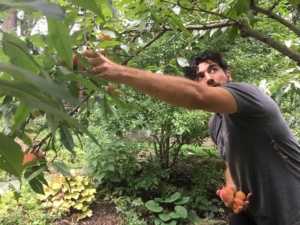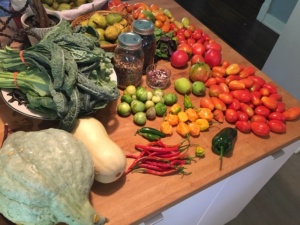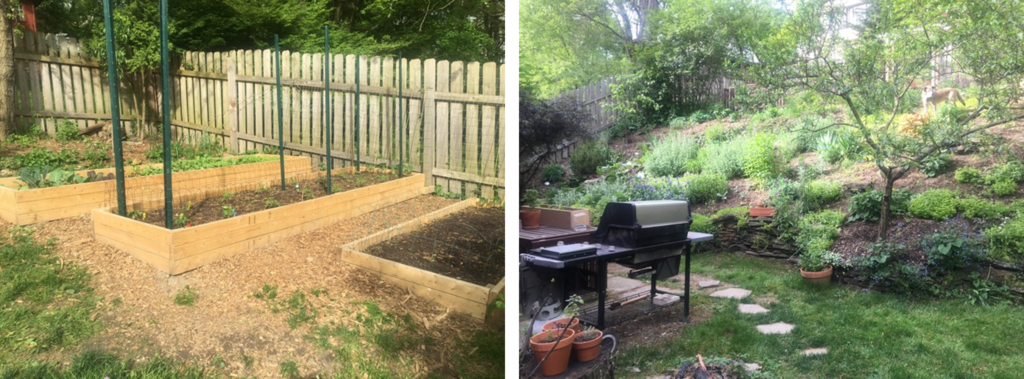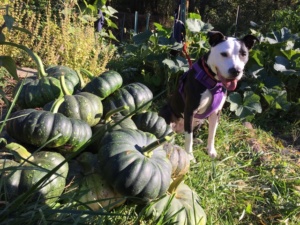 Welcome to Grower’s Spotlight, a new series to cultivate virtual community with other local growers while we’re all physically distant from each other. First up, meet Jordan Tony, a backyard homesteader from Forest Hills. A volunteer and member of the Garden Resource Center advisory committee, Jordan also lends a hand at Shiloh Farm as needed where wife Silvan works alongside Farmer Hanna on the Grow Pittsburgh production team. Like all of us at Grow Pittsburgh and surely many of you too, he misses the community aspect of gardening right now and can’t wait to get back to that. “I’ve made so many great friends, including Silvan, while growing food and I think it’s such a great way to connect with people from different backgrounds and ages.” Learn more about Jordan and be sure to follow him at @urban_homestead_pgh on Instagram for a wealth of informative and engaging growing and foraging content.
Welcome to Grower’s Spotlight, a new series to cultivate virtual community with other local growers while we’re all physically distant from each other. First up, meet Jordan Tony, a backyard homesteader from Forest Hills. A volunteer and member of the Garden Resource Center advisory committee, Jordan also lends a hand at Shiloh Farm as needed where wife Silvan works alongside Farmer Hanna on the Grow Pittsburgh production team. Like all of us at Grow Pittsburgh and surely many of you too, he misses the community aspect of gardening right now and can’t wait to get back to that. “I’ve made so many great friends, including Silvan, while growing food and I think it’s such a great way to connect with people from different backgrounds and ages.” Learn more about Jordan and be sure to follow him at @urban_homestead_pgh on Instagram for a wealth of informative and engaging growing and foraging content.
 GP: How many years have you been growing food and who taught you?
GP: How many years have you been growing food and who taught you?
Jordan: I’ve been growing some of my own food for about 12 years. Growing up, my family always had a garden in our yard and I used to help out my parents from time to time. I grew up in South Jersey and I have really fond memories of foraging wild blueberries in the woods with my mom and foraging (or maybe stealing?) grape leaves with my dad so I guess you could say my parents planted the seed. I started the first garden of my own in high school and it was an utter failure. During college, I worked on some small farms and learned a bit more. After graduating, I did a year-long sustainable farming apprenticeship at the Center for Environmental Farming Systems in Goldsboro, NC where I really learned most of what I know today.
GP: What type of gardening do you do (containers, community garden plot, etc)?
Jordan: Currently we grow most of our food in raised beds, but Silvan and I also ran a small farm where we had an acre of row crops for a couple years. When growing for ourselves the raised beds get the job done, but when growing for the market, rows are more efficient. We also experiment with container growing in our driveway so we can share techniques with our friends who don’t have yards.

GP: On your Instagram, you seem to focus on growing native and subsistence crops. Why is this?
Jordan: We grow subsistence crops because we’re striving to produce most of the food that we eat and you can’t really live off of tomatoes and strawberries alone. In order to grow enough food to store all winter we’ve dedicated most of our yard to edible plants, but instead of just tearing all the grass up and planting rows of potatoes and beans we wanted it to be a beautiful landscape in addition to a productive homestead. The native plants like elderberry, serviceberry, ramps and wild plum provide habitat and food for birds, chipmunks and insects and also allow us to eat interesting things that you can’t really buy at the grocery store.
GP: What’s your favorite thing to grow?
Jordan: It changes frequently, but this year I’m on a drying bean kick. They grow so well here, they enrich the soil, they’re one of the few protein rich plant foods that you can grow in a home garden, and they store all winter long without refrigeration.

GP: What’s your best piece of advice for a new grower?
Jordan: Don’t let growing food intimidate you. There’s a wealth of information online and in instructional books so just pick up some plants, pick a spot (or pot) and start growing! My favorite reference book right now is Organic Mushroom Farming and Mycoremediation by Tradd Cotter. I also recommend Farming in the Woods by Ken Mudge and Steve Gabriel for people who have a lot of shade, which is obviously common in the city.
Know another local gardener you’d like to see in the Growers Spotlight? Maybe it’s you! Drop us a line to be featured in our next newsletter or on our blog.
